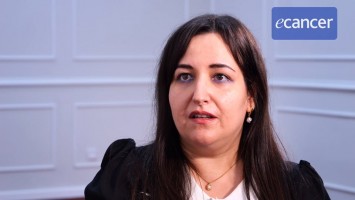IARC 50th Anniversary Conference
Screening and early detection of cervical cancer in Africa
Dr Lynette Denny - University of Cape Town, Cape Town, South Africa
What makes press is tuberculosis, malaria, HIV, the communicable diseases that tend to kill people pretty quickly and for which there are inadequate resources. The other things that make press are things like the Ebola outbreak or dramatic events of that type. Cancer is considered a rare and not important disease which is not true. There are approximately 600,000 people in Africa who develop cancer every year. Out of the 52 countries less than 30 have any form of cancer treatment available to their patients. Most patients with cancer present late at an untreatable and incurable stage so it has a tremendous stigma.
Is the pattern of cancer in Africa different from the rest of the world?
That is correct. About 30-36% of cancers in Africa are infectious disease related, one of them being, of course, HIV which is known to be a harbinger of diseases like cancer of the cervix, like Hodgkin’s lymphoma and Kaposi’s sarcoma. Hepatitis B is associated with liver cancer, hepatitis C is also associated with liver cancer and then there’s Helicobacter pylori which is associated with stomach cancer amongst others.
Which cancers are currently easily prevented in Africa?
Certainly Helicobacter pylori can be prevented by mass screening probably. Hepatitis B, in fact it took twenty years after the discovery of the hepatitis B vaccine to come to Africa because it was too expensive and it was only when it became an infant vaccine at 25 cents a shot that they introduced hepatitis B vaccine into Africa and it’s already shown quite a big difference, as it has in some Asian and Southeast Asian countries where it has been introduced. We can do schistosomiasis which causes bladder cancer, that can be treated by proper water and sanitation. HPV, well HPV related cancers, particularly cervical cancer, can now most likely be prevented by the HPV vaccine which is being introduced.
Is the Pap smear satisfactory for use in Africa to detect cervical cancer?
No, the Pap smear requires a health infrastructure that no-one has been able to either initiate or sustain in any developing country. It’s a good test and it made a huge difference to cervical cancer incidence in the ‘50s, ‘60s and ‘70s in northern countries that were able to implement the correct way of doing Pap smears. But for Africa it’s just too complex and there are too many sick people from other causes.
What is the solution?
We’ve been working for the last 15-20 years looking at a way of screening a woman with a test that’s affordable, acceptable and accurate that could give you results such that you could treat her at the same visit. We’ve done the work, people said, ‘You’re crazy,’ what we’ve been doing is doing testing for the human papilloma virus DNA of which there are fifteen high risk types and we showed in a randomised controlled trial that you could screen a woman with HPV, human papilloma virus testing, compare it to visual inspection where you just wash the cervix with a bit of vinegar and look for a white lesion, compared to an untreated group. We showed that HPV DNA testing was very, very successful.
In practical terms, what needs to be done next?
There is new technology that has been developed and it’s called HPVExpert where you can take a sample from the cervix, it goes into a special machine with a cartridge which you can do individually, you don’t have to batch it. It gives you a result in one hour.
What is your call to action to prevent cancer in Africa?
Preventing cervical cancer and other cancers is a lot more than the device, it’s a lot more than putting a needle in a child’s arm. It needs a health system and one of the things the Ebola outbreak should have taught us is that if your health systems are weak it’s very difficult to sustain preventative or even curative services. So we need our Ministries of Health in Africa to recognise that they should probably be spending 15% of GDP on health throughout their countries. There was, in fact, a declaration made in Abuja to do exactly that, I think only two countries have reached that.
How could you implement and motivate this change?
If you have a healthy community and a healthy society you have greater labour productivity, you have greater educational attainment and with those you slot in, you slide in, to the growth dynamic. There’s something called the demographic dividend where you actually reduce your community’s need for government support. So you work towards universal health coverage in a creative way that works for your particular country but ultimately you’re looking at economic growth driven by a healthy nation.
Where do you see cancer doctors and medical professionals fitting in to all of this?
One, advocacy and bringing to people’s attention that this is a problem. Two, getting treatment facilities available where most people can access them. And, three, providing decent palliative care.








